新版人教版六年级英语上册重难点知识点综合
- 格式:pdf
- 大小:493.18 KB
- 文档页数:14
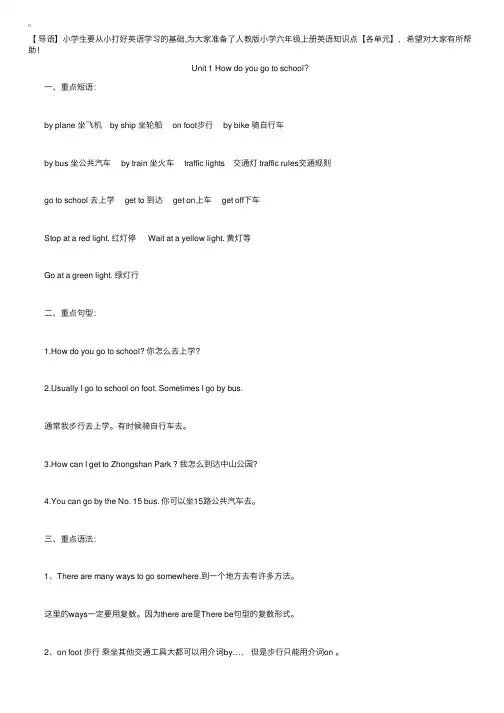
【导语】⼩学⽣要从⼩打好英语学习的基础,为⼤家准备了⼈教版⼩学六年级上册英语知识点【各单元】,希望对⼤家有所帮助!Unit 1 How do you go to school?⼀、重点短语:by plane 坐飞机 by ship 坐轮船 on foot步⾏ by bike 骑⾃⾏车by bus 坐公共汽车 by train 坐⽕车 traffic lights 交通灯 traffic rules交通规则go to school 去上学 get to 到达 get on上车 get off下车Stop at a red light. 红灯停 Wait at a yellow light. 黄灯等Go at a green light. 绿灯⾏⼆、重点句型:1.How do you go to school? 你怎么去上学?ually I go to school on foot. Sometimes I go by bus.通常我步⾏去上学。
有时候骑⾃⾏车去。
3.How can I get to Zhongshan Park ? 我怎么到达中⼭公园?4.You can go by the No. 15 bus. 你可以坐15路公共汽车去。
三、重点语法:1、There are many ways to go somewhere.到⼀个地⽅去有许多⽅法。
这⾥的ways⼀定要⽤复数。
因为there are是There be句型的复数形式。
2、on foot 步⾏乘坐其他交通⼯具⼤都可以⽤介词by…,但是步⾏只能⽤介词on 。
4、go to school的前⾯绝对不能加the,这⾥是固定搭配。
5、USA 和 US 都是美国的意思。
另外America也是美国的意思。
6、go to the park 前⾯⼀定要加the. 如果要去的地⽅有具体的名字,就不能再加the ,如果要去的地⽅没有具体名字,都要在前⾯加the. ( go to school除外。
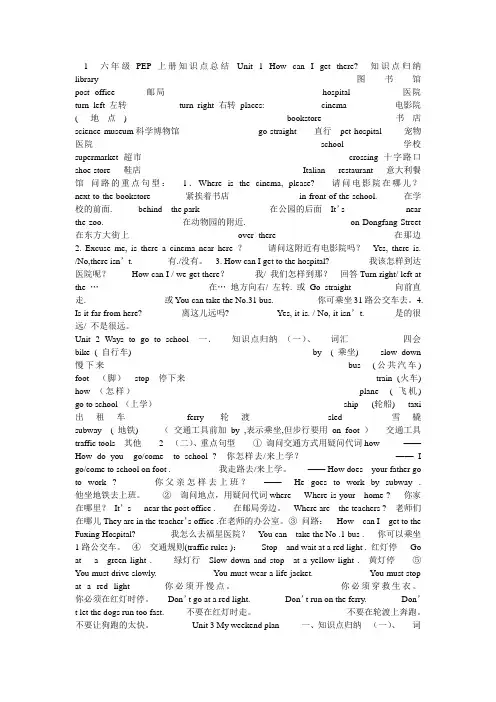
1 六年级PEP上册知识点总结Unit 1 How can I get there? 知识点归纳library 图书馆post office 邮局hospital 医院turn left 左转turn right 右转places: cinema 电影院( 地点) bookstore 书店science museum科学博物馆go straight 直行pet hospital 宠物医院school 学校supermarket 超市crossing 十字路口shoe store 鞋店Italian restaurant 意大利餐馆问路的重点句型:1.Where is the cinema, please? 请问电影院在哪儿?next to the bookstore 紧挨着书店in front of the school. 在学校的前面. behind the park 在公园的后面It’s near the zoo. 在动物园的附近. on Dongfang Street 在东方大街上over there 在那边2. Excuse me, is there a cinema near here ?请问这附近有电影院吗?Yes, there is. /No,there isn’t. 有./没有。
3. How can I get to the hospital? 我该怎样到达医院呢?How can I / we get there?我/ 我们怎样到那?回答Turn right/ left at the …在…地方向右/ 左转. 或Go straight 向前直走. 或You can take the No.31 bus. 你可乘坐31路公交车去。
4. Is it far from here? 离这儿远吗? Yes, it is. / No, it isn’t. 是的很远/ 不是很远。
Unit 2 Ways to go to school 一.知识点归纳(一)、词汇四会bike ( 自行车) by ( 乘坐) slow down 慢下来bus (公共汽车) foot (脚)stop 停下来train (火车) how (怎样)plane ( 飞机) go to school (上学)ship (轮船) taxi 出租车ferry 轮渡sled 雪橇subway ( 地铁) (交通工具前加by ,表示乘坐,但步行要用on foot )交通工具traffic tools 其他 2 (二)、重点句型①询问交通方式用疑问代词how ——How do you go/come to school ? 你怎样去/来上学?——I go/come to school on foot . 我走路去/来上学。
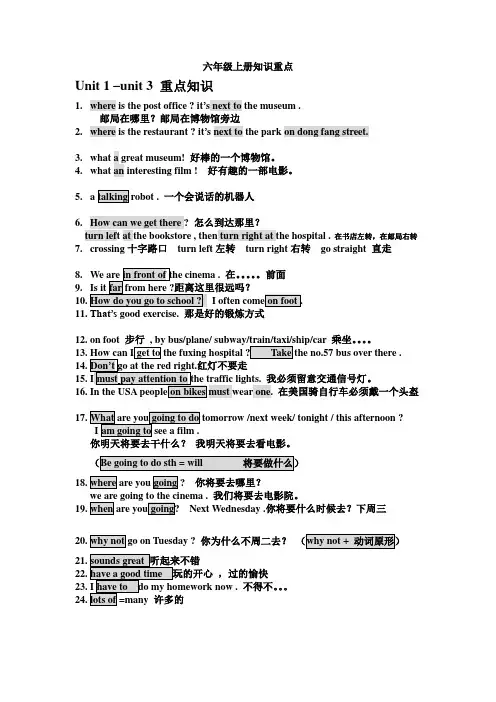
六年级上册知识重点Unit 1 –unit 3 重点知识1.where is the post office ? it’s next to the museum .邮局在哪里?邮局在博物馆旁边2.where is the restaurant ? it’s next to the park on dong fang street.3.what a great museum! 好棒的一个博物馆。
4.what an interesting film ! 好有趣的一部电影。
5.一个会说话的机器人6.How can we get there ? 怎么到达那里?turn left at the bookstore , then turn right at the hospital .在书店左转,在邮局右转7.crossing十字路口turn left左转turn right右转go straight 直走8.在。
前面9.10.11.12.乘坐。
13.14.15.I must pay attention to the traffic lights. 我必须留意交通信号灯。
16.In the USA people on bikes must wear one. 在美国骑自行车必须戴一个头盔17.18.你将要去哪里?我们将要去电影院。
19.Next Wednesday .你将要什么时候去?下周三20.你为什么不周二去?21.22.,过的愉快23.不得不。
24.unit 4-unit6 重点知识25.what are your his/her hobbies ?26.练习功夫27.28.中国歌曲Chinese song 好主意good idea 很有趣that’s interesting29.He lives on a farm.30.31.32.33.go—likes34.他/35.(同义句36.,I want to be a businessman .37.他在海上工作。
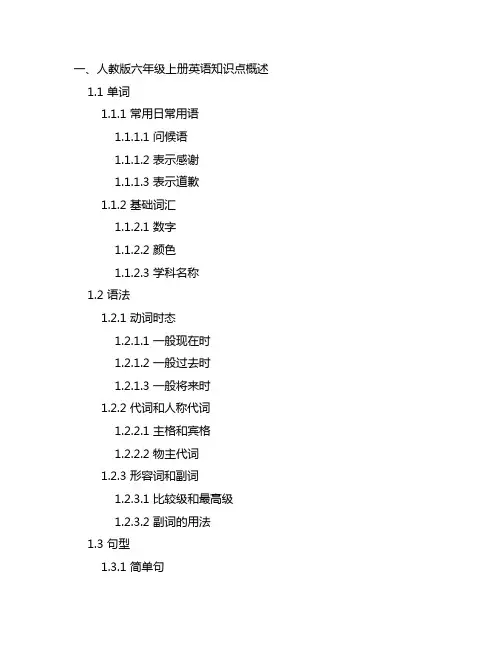
一、人教版六年级上册英语知识点概述1.1 单词1.1.1 常用日常用语1.1.1.1 问候语1.1.1.2 表示感谢1.1.1.3 表示道歉1.1.2 基础词汇1.1.2.1 数字1.1.2.2 颜色1.1.2.3 学科名称1.2 语法1.2.1 动词时态1.2.1.1 一般现在时1.2.1.2 一般过去时1.2.1.3 一般将来时1.2.2 代词和人称代词1.2.2.1 主格和宾格1.2.2.2 物主代词1.2.3 形容词和副词1.2.3.1 比较级和最高级1.2.3.2 副词的用法1.3 句型1.3.1 简单句1.3.1.1 肯定句1.3.1.2 否定句1.3.1.3 疑问句1.3.2 复合句1.3.2.1 并列句1.3.2.2 定语从句1.3.2.3 状语从句二、人教版六年级上册英语知识点详解2.1 单词2.1.1 常用日常用语2.1.1.1 问候语问候语是指在英语日常交际中用于打招呼和示好的常用词汇,包括Hello、Hi、Good morning、Good afternoon等等。
2.1.1.2 表示感谢表示感谢的常用词汇有Thank you、Thanks a lot、Thank you very much等,用于表达对别人的帮助或礼物表示感激之情。
2.1.1.3 表示道歉表示道歉的词汇包括I'm sorry、Excuse me、Pardon等,在日常生活中,用于向别人道歉或请求对方让步的场合。
2.1.2 基础词汇2.1.2.1 数字数字是英语基础词汇的重要部分,包括基本的数字表达方式和计量单位,如one、two、three等,以及hundred、thousand等。
2.1.2.2 颜色颜色是描述事物外观的重要词汇,在日常交流中也经常用到,包括red、blue、yellow等常见颜色词汇。
2.1.2.3 学科名称学科名称涉及到人们日常生活和学习工作的方方面面,包括mathematics、music、art等,是学习英语时必须掌握的词汇。
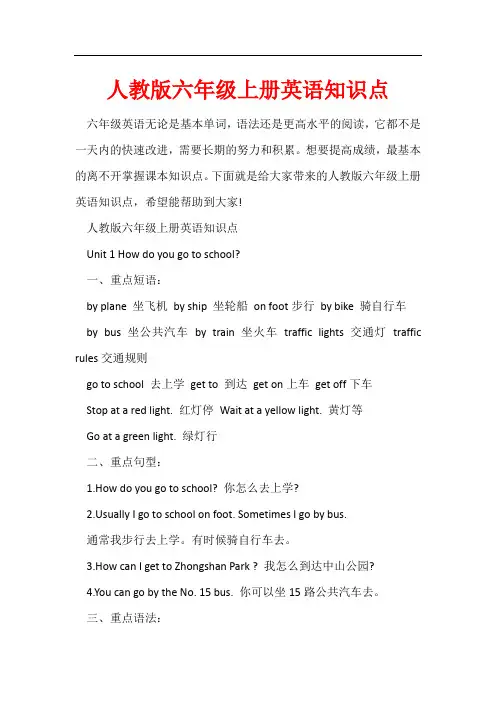
人教版六年级上册英语知识点六年级英语无论是基本单词,语法还是更高水平的阅读,它都不是一天内的快速改进,需要长期的努力和积累。
想要提高成绩,最基本的离不开掌握课本知识点。
下面就是给大家带来的人教版六年级上册英语知识点,希望能帮助到大家!人教版六年级上册英语知识点Unit 1 How do you go to school?一、重点短语:by plane 坐飞机by ship 坐轮船on foot步行by bike 骑自行车by bus 坐公共汽车by train 坐火车traffic lights 交通灯traffic rules交通规则go to school 去上学get to 到达get on上车get off下车Stop at a red light. 红灯停Wait at a yellow light. 黄灯等Go at a green light. 绿灯行二、重点句型:1.How do you go to school? 你怎么去上学?ually I go to school on foot. Sometimes I go by bus.通常我步行去上学。
有时候骑自行车去。
3.How can I get to Zhongshan Park ? 我怎么到达中山公园?4.You can go by the No. 15 bus. 你可以坐15路公共汽车去。
三、重点语法:1、There are many ways to go somewhere.到一个地方去有许多方法。
这里的ways一定要用复数。
因为there are是There be句型的复数形式。
2、on foot 步行乘坐其他交通工具大都可以用介词by…,但是步行只能用介词on 。
4、go to school的前面绝对不能加the,这里是固定搭配。
5、USA 和US 都是美国的意思。
另外America也是美国的意思。
6、go to the park 前面一定要加the. 如果要去的地方有具体的名字,就不能再加the ,如果要去的地方没有具体名字,都要在前面加the. ( go to school除外。

1 六年级PEP上册知识点总结Unit 1 How can I get there? 知识点归纳library 图书馆post office 邮局hospital 医院turn left 左转turn right 右转places: cinema 电影院( 地点) bookstore 书店science museum科学博物馆go straight 直行pet hospital 宠物医院school 学校supermarket 超市crossing 十字路口shoe store 鞋店Italian restaurant 意大利餐馆问路的重点句型:1.Where is the cinema, please? 请问电影院在哪儿?next to the bookstore 紧挨着书店in front of the school. 在学校的前面. behind the park 在公园的后面It’s near the zoo. 在动物园的附近. on Dongfang Street 在东方大街上over there 在那边2. Excuse me, is there a cinema near here ?请问这附近有电影院吗?Yes, there is. /No,there isn’t. 有./没有。
3. How can I get to the hospital? 我该怎样到达医院呢?How can I / we get there?我/ 我们怎样到那?回答Turn right/ left at the …在…地方向右/ 左转. 或Go straight 向前直走. 或You can take the No.31 bus. 你可乘坐31路公交车去。
4. Is it far from here? 离这儿远吗? Yes, it is. / No, it isn’t. 是的很远/ 不是很远。
Unit 2 Ways to go to school 一.知识点归纳(一)、词汇四会bike ( 自行车) by ( 乘坐) slow down 慢下来bus (公共汽车) foot (脚)stop 停下来train (火车) how (怎样)plane ( 飞机) go to school (上学)ship (轮船) taxi 出租车ferry 轮渡sled 雪橇subway ( 地铁) (交通工具前加by ,表示乘坐,但步行要用on foot )交通工具traffic tools 其他 2 (二)、重点句型①询问交通方式用疑问代词how ——How do you go/come to school ? 你怎样去/来上学?——I go/come to school on foot . 我走路去/来上学。

人教版六年级英语上册《Unit4 I have a pen pal》重点难点知识梳理重点:询问某人爱好的问句及其答语;英语中常用的几种表建议的句型;由do/does引导的一般疑问句。
难点:动词-ing形式的变化规则;复习一般现在时。
【词组】do kung fu 练功夫climb mountains 爬山do word puzzles 猜字listen to music 听音乐go hiking 去远足read stories 读故事fly kites 放风等cook Chinese food 烹饪中国食物draw cartoons 画漫画be interested in 对….感兴pay football 踢足球play sports 进行体育运动play the pipa 弹琵琶【惯用表达式】1. Good idea! 好主意2. Me too! 我也是3. Really? 真的吗?4. Don' t worry. 别担心。
【重点句子与句型】1. 询问某人爱好的问句及其答语问句:What are sb. ' s hobbies?答语:主语+ like /likes+动词-ing形式(+其他)例:-What are Peter' s hobbies? 皮特的爱好是什么? -He likes reading stories. 他喜欢读故事。
2.由do/does引导的一般疑问句及其答语。
问句:Do/Does+主语+动词原形+其他?答语:Yes,主语+do/does./ No, 主语+don't/doesn't 例:-Does he live in Sydney? 他住在悉尼吗-No,he doesn't. 不,他不住在悉尼。
3.询问他人是否喜欢做某事的问句及其答语:问句:Does+主语(第三人称单数)+like+动词-ing形式(+其他)? 答语:Yes, he/she does. , he/she doesn't.例:-Does he like doing word puzzles and going hiking? 他喜欢猜字迷和去远足吗?-Yes,he does.是的,他喜欢。
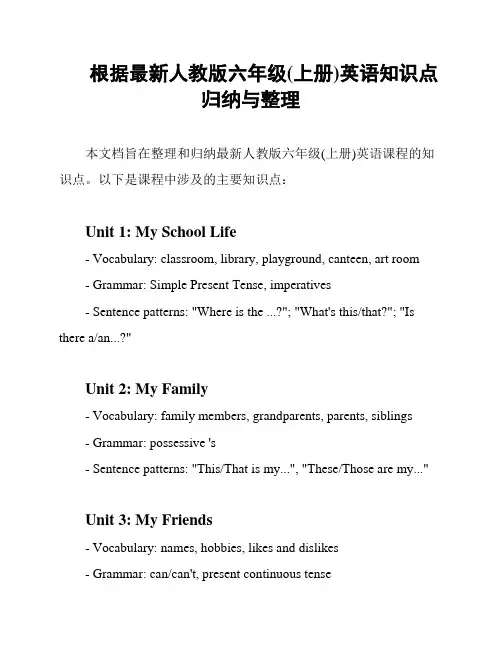
根据最新人教版六年级(上册)英语知识点归纳与整理本文档旨在整理和归纳最新人教版六年级(上册)英语课程的知识点。
以下是课程中涉及的主要知识点:Unit 1: My School Life- Vocabulary: classroom, library, playground, canteen, art room- Grammar: Simple Present Tense, imperatives- Sentence patterns: "Where is the ...?"; "What's this/that?"; "Is there a/an...?"Unit 2: My Family- Vocabulary: family members, grandparents, parents, siblings- Grammar: possessive 's- Sentence patterns: "This/That is my...", "These/Those are my..."Unit 3: My Friends- Vocabulary: names, hobbies, likes and dislikes- Grammar: can/can't, present continuous tense- Sentence patterns: "What's your name?", "What's his/her name?", "Do you like...?"Unit 4: My Daily Routine- Vocabulary: activities, daily routine, time- Grammar: adverbs of frequency, prepositions of time- Sentence patterns: "What time do you...?", "I usually..."Unit 5: My Home- Vocabulary: rooms, furniture, objects- Grammar: there is/are, countable and uncountable nouns- Sentence patterns: "Are there any...?", "There is/are..."Unit 6: My Country- Vocabulary: countries, nationalities, languages, cities以上是六年级(上册)英语课程的主要知识点概览。
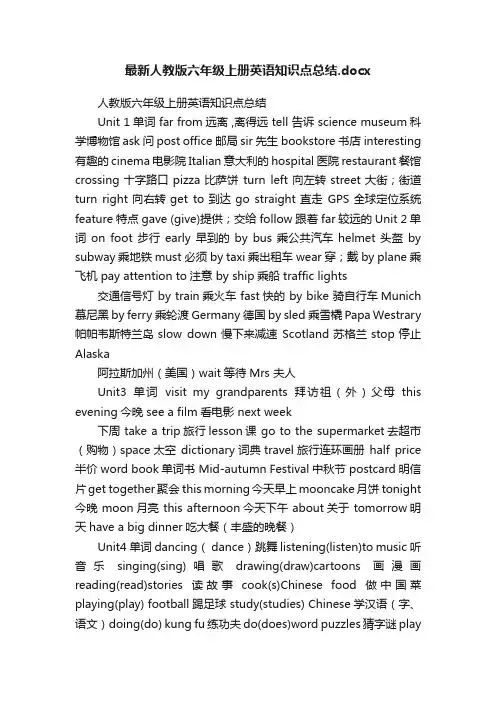
最新人教版六年级上册英语知识点总结.docx人教版六年级上册英语知识点总结Unit 1单词 far from远离 ,离得远 tell 告诉 science museum科学博物馆 ask问 post office邮局 sir先生bookstore书店interesting 有趣的cinema电影院Italian意大利的hospital医院restaurant餐馆crossing十字路口pizza比萨饼turn left向左转street大街;街道turn right向右转get to到达go straight直走GPS全球定位系统feature特点 gave (give)提供;交给follow跟着 far较远的Unit 2单词on foot步行early早到的by bus乘公共汽车helmet头盔by subway乘地铁must 必须 by taxi乘出租车wear穿;戴 by plane乘飞机 pay attention to注意 by ship乘船 traffic lights交通信号灯 by train乘火车 fast快的 by bike 骑自行车Munich 慕尼黑 by ferry乘轮渡Germany德国 by sled乘雪橇 Papa Westrary 帕帕韦斯特兰岛slow down慢下来减速Scotland苏格兰stop停止Alaska阿拉斯加州(美国)wait等待Mrs 夫人Unit3单词visit my grandparents拜访祖(外)父母this evening今晚 see a film看电影 next week下周 take a trip旅行lesson课 go to the supermarket去超市(购物)space太空dictionary词典travel旅行连环画册half price 半价 word book单词书 Mid-autumn Festival中秋节 postcard明信片get together聚会 this morning今天早上mooncake月饼 tonight 今晚 moon月亮 this afternoon今天下午 about关于 tomorrow明天have a big dinner吃大餐(丰盛的晚餐)Unit4单词 dancing( dance)跳舞 listening(listen)to music听音乐singing(sing)唱歌drawing(draw)cartoons画漫画reading(read)stories读故事cook(s)Chinese food做中国菜playing(play) football踢足球 study(studies) Chinese学汉语(字、语文)doing(do) kung fu练功夫do(does)word puzzles猜字谜playsports做运动go(goes)hiking远足watch TV看电视hobby(复hobbies)爱好climbing(climb)mountains爬山pen pal笔友play the pipa弹琵琶 jasmine flower茉莉花 Good idea好主意amazing令人惊讶的Canberra堪培拉shall表征求意见goal射门 club俱乐部join加入share分享Unit5单词 factory worker工厂工人university大学 postman邮递员gym体育馆businessman商人if如果police officer警察reporter记者fisherman渔民use使用scientist科学家type打字pilot飞行员 quickly迅速地 coach 教练 secretary秘书 country国家;乡村boat船 head teacher校长sea大海stay保持Unit 6单词angry生气的bad 邪恶的;坏的afraid害怕hurt (使)受伤sad难过的ill 有病;不舒服worried担心的;发愁的wrong有毛病happy高兴的should应该 see a doctor看病 feel觉得;感到do more exercise多做运动 well健康;身体好wear warm clothes穿暖户的衣服sit坐 take a deep breath深吸一口气grass草坪 count to ten数到十hear 听见 chase追赶ant蚂蚁 mice( mouse 的复数)老鼠worry担心;担忧stuck陷住, 无法移动pull拉;拽mud泥everyone每人新六上英语重点句子☆为四会句子U1 ☆1、☆Where is the museum shop?博物馆的商店在哪儿?☆☆2 、It ’ s near the door.在大门附近.☆3 、 I want to buy a postcard.我想买一张明信片 .4 、 I want to send it today.我想今天寄出 .5 、I ’ ll ask.我去问问 .6 、 Wow, a talking robot!哇!一个讲话机器人 .7 、 What a great museum!好棒的一家博物馆!8 、 There is a pet hospital in my city.在我的城市有一家宠物医院 .9 、Wu Yifan and Robin are looking at some robots.吴一凡和罗宾正在看一些机器人.☆ 10 、 How can we get there?我们怎么到那儿?☆☆ 11、 Turn left at the bookstore.在书店左转.☆12 、 I know a great Italian restaurant.我知道一家很棒的意大利餐厅.13 、 Chen Jie is trying to be a tour guide for Oliver in Beijing.陈洁正试图给奥利佛当北京的向导.14 、Wu Yinfan’ s grandpa gave Robin a new feature.吴一凡的爷爷给罗宾增加了一个新功能.15 、 My new GPS works!我的全球定位系统起作用了.16 、 My stomach hurts.我的胃不舒服了.U2 ☆1、?你怎么来学校的?☆☆2 、 .通常我走路来.☆☆ 3 、Don’t go at the red light!别闯红灯!☆☆4 、I must pay attention to the traffic lights!我必须注意交通信号灯!☆☆5 、 In the USA people on bikes must wear one.在美国骑自行车的人必须戴(头盔). ☆U3☆1、What are you going to do tomorrow?你明天打算做什么?☆☆ 2 、I ’m going to have an art lesson.我要上美术课. ☆☆ 3 We’ re going to draw some pictur es in Renmin Park.我们要到人民公园去画画. ☆4 、I ’ m going to see a film.我打算去看电影.5 、I ’ m going to visit my grandparents.我打算去看望外祖父母 .☆ 6 、Where are you going?你们打算去哪儿?☆☆ 7 、We’re going to the cinema.我们打算去电影院. ☆☆ 8 、 When are you going?你们什么时候去?☆9 、I ’我打算去买一本新漫画书.10 、What are you going to buy?你打算买什么?11 、My aunt is going to make mooncakes.我的阿姨将做一些月饼. -12 、My grandma will tell us a story about Chang’ 我e.奶奶(外婆)将会给我们讲嫦娥的故事.☆ U4 1、What are Peter’s hobbies?彼得有什么爱好?☆☆ 2 、He likes reading stories.他喜欢读故事. ☆3 、 He lives on a farm, so sometimes he reads to the cows.4、他住在农场上,有时候他给奶牛讲故事. 5 、He likes doing kung fu and swimming.他喜欢练武术和游泳.6、He also likes singing.他还喜欢唱歌.☆ 7 、 Does he live in Sydney?他住在悉尼吗?☆☆ 8 、No, he doesn’ t不.,他没有.☆☆ 9Does he like doing word puzzles and going hiking?他喜欢猜字谜和远足吗?☆☆ 10 、Yes, he does.是的,他喜欢.☆11、He lives in Australia, but he studies Chinese.他住在澳大利亚, 但是他学习中文.U5 ☆1、What does he do?他是做什么的?☆☆ 2 、He’ s a businessman.他是商人.☆3、He often goes to other countries.他经常去其他国家.4、What does your mother do?你妈妈是做什么的?5 、She ’ s a head teacher.她是一名校长.6 、 Do you want to be a head teacher, too?你也想成为一名校长吗?7、I want to be a taxi driver.我想成为一名出租车司机.☆ 8 、 Where does he work?他在哪儿工作?☆☆ 9 、 He works at sea.他在海上工作. ☆☆ 10 、 How does he go to work?他怎么上班?☆☆ 11 、 He goes to work by bike.他骑自行车上班. ☆12、He has a very healthy life.他有一个很健康的生活.13 、 He works very hard and stays healthy.他工作很努力, 身体很健康 .14 、 She works at a university.她在一所大学工作.U6 ☆1、They are afraid of him.它害怕它.☆☆ 2 、 The cat is angry with them.只猫很生气.☆3 、 Because the mice are bad.因老鼠很坏.4 、 They hurt people.他害人.5 、 Sarah is angry.拉很生气.6 、 The cat is ill.只猫生病了.7 、 Sarah and the cat are worried.拉和猫咪很着急.☆ 8 、 What's wrong?怎么了?☆☆ 9 、Your father is ill.你爸爸生病了. ☆☆ 10 、 He should see a doctor this morning.他今天早上去看病. ☆☆11 、Don ’ t be sad. 心!☆12、 How does Dad feel now?爸爸在感怎么?13 、 Not well.不是很好 .14、 What should I do?我做什么?15、 You should wear warm clothes.你穿上保暖的衣服 .16 、 You should do more exercise.你做更多的运 .17、 You should take a deep breath and count to ten.你深呼吸然后数到十 .18、 Do more exercise.做更多的运 .19、 Wear warm clothes.穿上温暖的衣服 .20、 Take a deep breath.深呼吸 .名:drive— driver 司机clean— cleaner 清工sing—singer 歌手 teach— teacher 教write — writer 作家 dance— dancer 舞蹈家football player 足球运三形式化构成法例 A. 一般在尾加 -s help— helps make– makes cook—cooks play —plays read—reads write—writes B. 以o,s,x,ch,sh,尾的在尾加-es go —goes do —does pass —passes fix– fixes teach—teaches watch— watches wash—washes C 以音字母加y 尾的, 先yi, 再加-es fly –flies study–studies carry -- carries E. 不化(牢) have---has I have a word book.我有一本 .He has a word book.他有一本第三人称数He She It个人名(Amy,Zhang Peng,Oliver)个称呼(My father,My mother,My teacher,My friend,My pen pal?).另:我( I )用 am, 你( you)用are,is用于他(he )、她(she)、它(it ), 我(we), 你( you ) , 他( they)都用 are.— ing形式化构成法例 A. 一般加 -ing work— working study —studying play — playing watch — watching draw— drawing do —doing sing— singing read—reading B.以不音的 e 尾的去e 后加-ing live—living write—writing dance--dancing make —making take--taking C.双写最后一个字母加ing stop--stopping run -- running swim -- swimming put— putting sit—sitting人教版六年级上册英语知识点总结。
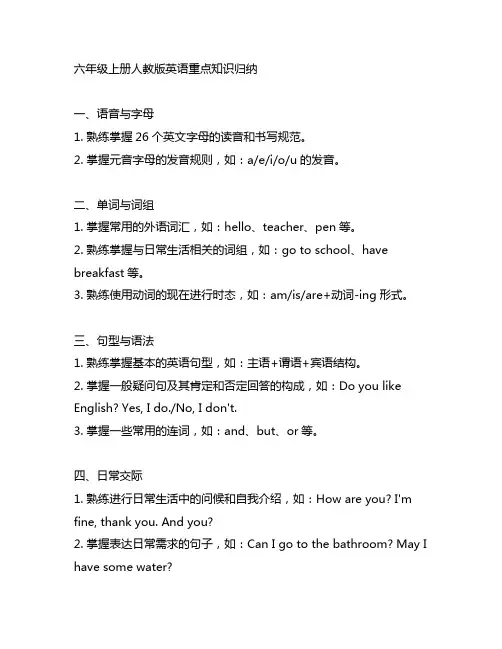
六年级上册人教版英语重点知识归纳一、语音与字母1. 熟练掌握26个英文字母的读音和书写规范。
2. 掌握元音字母的发音规则,如:a/e/i/o/u的发音。
二、单词与词组1. 掌握常用的外语词汇,如:hello、teacher、pen等。
2. 熟练掌握与日常生活相关的词组,如:go to school、have breakfast等。
3. 熟练使用动词的现在进行时态,如:am/is/are+动词-ing形式。
三、句型与语法1. 熟练掌握基本的英语句型,如:主语+谓语+宾语结构。
2. 掌握一般疑问句及其肯定和否定回答的构成,如:Do you like English? Yes, I do./No, I don't.3. 掌握一些常用的连词,如:and、but、or等。
四、日常交际1. 熟练进行日常生活中的问候和自我介绍,如:How are you? I'm fine, thank you. And you?2. 掌握表达日常需求的句子,如:Can I go to the bathroom? May I have some water?3. 熟练运用英语进行简单的交流,如:What's your name? My name is Lily.五、阅读与书写1. 能够读懂简单的英文短文或对话,并能够提取出关键信息。
2. 能够正确书写简单的英文句子或短文。
结语六年级上册人教版英语重点知识归纳主要包括语音与字母、单词与词组、句型与语法、日常交际以及阅读与书写等内容。
通过系统的学习和练习,学生能够掌握基本的英语知识,为后续学习打下良好的基础。
希望同学们能够认真对待英语学习,不断积累词汇和语法知识,不断提高听、说、读、写的能力,从而更好地应对英语学习中的挑战。
六年级上册人教版英语重点知识归纳六、语音与字母的扩展1. 学习发音时应注意元音和辅音字母的发音区别,如:cat中的/a/发音与dog中的/o/发音不同。
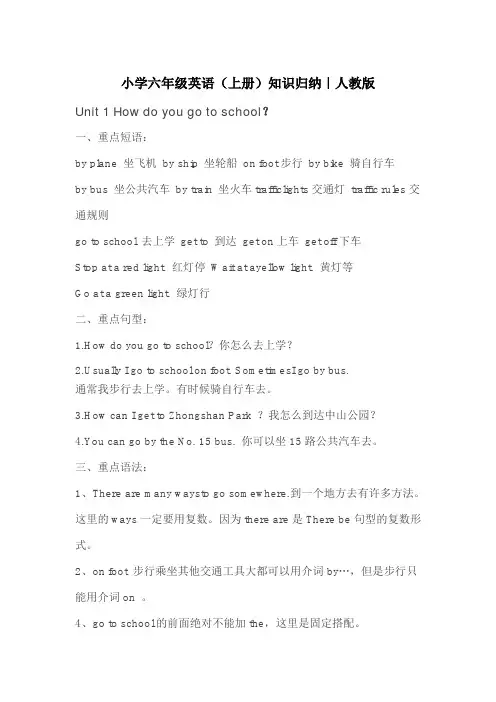
小学六年级英语(上册)知识归纳|人教版Unit 1 How do you go to school?一、重点短语:by plane 坐飞机by ship 坐轮船on foot步行by bike 骑自行车by bus 坐公共汽车by train 坐火车trafficlights交通灯traffic rules交通规则go to school 去上学get to 到达get on上车get off下车Stop at a red light. 红灯停Wait at ayellow light. 黄灯等Go at a green light. 绿灯行二、重点句型:1.How do you go to school?你怎么去上学?ually I go to school on foot. SometimesI go by bus.通常我步行去上学。
有时候骑自行车去。
3.How can I get to Zhongshan Park ?我怎么到达中山公园?4.You can go by the No. 15 bus. 你可以坐15路公共汽车去。
三、重点语法:1、There are many waysto go somewhere.到一个地方去有许多方法。
这里的ways一定要用复数。
因为there are是There be句型的复数形式。
2、on foot 步行乘坐其他交通工具大都可以用介词by…,但是步行只能用介词on 。
4、go to school的前面绝对不能加the,这里是固定搭配。
5、USA 和US 都是美国的意思。
另外America也是美国的意思。
6、go to the park 前面一定要加the. 如果要去的地方有具体的名字,就不能再加the ,如果要去的地方没有具体名字,都要在前面加the. (go to school除外。
)7、How do you go to …?你怎样到达某个地方?如果要问的是第三人称单数,则要用:How does he/she…go to …?8、反义词:get on(上车)---get off(下车)near(近的)—far(远的)fast(快的)—slow(慢的)because(因为)—why(为什么)same(相同的)—different(不同的)9、近义词:see you---goodbye sure---certainly---ofcourse10、频度副词:always 总是,一直usually 通常often经常sometimes 有时候never 从来不Unit 2 Where is the science museum?一、重点短语:library 图书馆post office 邮局hospital医院cinema 电影院bookstore书店science museum科学博物馆turnleft向左转turn right 向右转go straight 直行north北south南east东west西next to靠近、与……。
人教版PEP英语六年级上册必考知识点随着英语教育的不断发展,学生们对英语学习的要求也越来越高。
英语作为一门重要的外语,对于学生来说,掌握好英语知识是非常重要的。
人教版PEP英语六年级上册作为学生学习的重要教材,其中的必考知识点更是学生们需要重点掌握的内容。
下面就让我们来看一下人教版PEP英语六年级上册的必考知识点。
一、语音知识1. 26个字母的大小写形式及发音。
2. 单词中元音字母的发音规律。
3. 辅音字母C和G的发音规律。
二、词汇知识1. 数字的表达方式及拼写。
2. 一些常见的动词和形容词。
3. 表示时间、日期、星期的词汇。
三、句型知识1. 基本的英语句型及其构成。
2. 肯定句、否定句、一般疑问句的基本结构及变化规律。
3. 一般疑问句的提问词和助动词的使用规则。
四、语法知识1. 英文的基本时态(过去时、现在时、将来时)及其构成规律。
2. 形容词的比较级与最高级的构成和用法。
3. 不定冠词、定冠词和零冠词的用法及其特殊情况。
五、阅读技巧1. 词汇量的积累和理解能力的培养。
2. 对于文章中重点词语和句子的把握以及整体理解能力的培养。
3. 阅读短文时的逻辑思维和推理能力的培养。
六、书写规范1. 英文书写的基本规范和要求。
2. 字母大小写的正确使用。
3. 英文句子的书写结构和标点符号的使用规范。
以上就是人教版PEP英语六年级上册必考知识点的内容。
学生们在学习英语的过程中,要重点掌握以上知识点,扎实基础,提高自己的英语水平。
老师们也要在教学中注重对这些知识点的讲解和强化,帮助学生更好地掌握英语知识,提高学生的英语学习能力。
希望学生们在学习英语的过程中,能够充分利用好教材,努力提高自己的英语水平,为将来的学习和生活打下坚实的基础。
人教版PEP英语六年级上册必考知识点从上面列举的知识点中我们可以看出,英语学习需要学生们全方面的掌握,涉及到语音、词汇、句型、语法、阅读技巧和书写规范等多个方面。
下面我们来进一步深入了解这些知识点,并且提供更多的学习建议。
Unit 1 How can I get there?主要单词/短语:post office 邮局hospital医院cinema 电影院bookstore书店science museum科学博物馆turn left向左转turn right 向右转go straight 直行 crossing十字路口主要句子:1.Where is the museum shop?博物馆的商店在哪儿?2.It’s near the door.在大门附近。
3.I want to buy a postcard. 我想买一张明信片。
4.I want to send the postcard today. 我想今天寄出5.What a great museum! 好棒的一家博物馆!6.There is a pet hospital in my city. 在我的城市有一家宠物医院。
There be 句型7.How can we get there?我们怎么到那儿?Turn left at the bookstore.在书店左转。
8.I know a great Italian restaurant. 我知道一家很棒的意大利餐厅。
重点知识1.询问地点在哪:Where is the +地点...?及方位介词的用法Where is the cinema? 电影院在哪?It’s near the zoo. 它在动物园附近。
回答:near(附近)Array next to(旁边)It’s behind(后面)the +地点in front of(前面)2.问路和指路:问路:How can I get to the +地点?How can I get there/ here ?How can I get to the cinema? 我怎样到达电影院?注意:get+地点副词(here/there/home)时,不加to。
其余要加。
最新新人教版英语六年级上册知识点总结Unit 2 Ways to go to school 一.知识点归纳(一)、词汇四会bike ( 自行车) by ( 乘坐) slow down 慢下来bus (公共汽车) foot (脚)stop 停下来train (火车) how (怎样)plane ( 飞机) go to school (上学)ship (轮船) taxi 出租车ferry 轮渡sled 雪橇subway ( 地铁) (交通工具前加by ,表示乘坐,但步行要用on foot )交通工具traffic tools 其他 2 (二)、重点句型①询问交通方式用疑问代词——你怎样去/来上学?——我走路去/来上学. ——How does your father go to work ? 你父亲怎样去上班?——He goes to work by subway . 他坐地铁去上班. ②询问地点,用疑问代词where Where is your home ? 你家在哪里?It’s near the post office . 在邮局旁边. Where are the teachers ? 老师们在哪儿They are in the teacher’s office .在老师的办公室. ③问路:How can I get to the Fuxing Hospital? 我怎么去福星医院?You can take the No .1 bus . 你可以乘坐1路公交车. ④交通规则(traffic rules ):Stop and wait at a red light . 红灯停Go at a green light . 绿灯行Slow down and stop at a yellow light . 黄灯停⑤You must drive slowly. You must wear a life jacket. You must stop at a red light 你必须开慢点. 你必须穿救生衣. 你必须在红灯时停. Don’t go at a red light. Don’t run on the ferry. Don’t let the dogs run too fast. 不要在红灯时走. 不要在轮渡上奔跑. 不要让狗跑的太快. Unit 3 My weekend plan 一、知识点归纳(一)、词汇四会next week /weekend 下周/ 周末newspaper 报纸this morning 今天上午漫画书Time this afternoon 今天下午word book 单词书(时间) this evening 今天晚上this weekend 这个周末dictionary 字典tonight 今夜tomorrow 明天post card 明信片take a trip 去旅游theme park 主题公园activities see a film 看电影others pet shop 宠物店(活动)go to the supermarket 去看电影(其他)supermarket 超市visit my grandparents 参观祖父母shoe store 鞋店二、重点句式和句型:本单元中出现的一个重点语法是一般将来时:表示将要发生的动作或状态,常和表示将来的时间连用. 构成:陈述肯定句:主语+ be going to + 动词原形+ 其他例子I am going to (go to) the bookstore by bus this afternoon. He/ She is going to take a trip by train this weekend. We/ They are going to see a film tonight. 3 否定句:主语+ be + not going to +动词原形+其他例子I am not going to (go to) the bookstore by bus this afternoon. He/ She is not going to take a trip by train this weekend. We/ They are not going to see a film tonight. 一般疑问句:Be+ 主语+ going to +动词原形+其他? 例子:Are you going to the bookstore by bus this afternoon? Yes,I am . No,I’m not. Is he/ She going to take a trip by train this weekend?Yes,he/ She is. No,he/ She isn’t. Are we/ they going to see a film tonight? Yes,we/ they are. No,we/ they aren’t. 特殊疑问句:特殊疑问词+ 一般疑问句?例子:What are you going to do this afternoon? Where are you going this afternoon? How are you going to the bookstore this afternoon? When are you going to the bookstore by bus? (以上特殊疑问句中are you 可以替换为is he ,is she,are they,are we等) 三、重点句型: 1. we’re going to see a film about space trael! 我们将要去看关于火星之旅的电影.2. We are going to draw some pictures in Renmin Park.我们打算去人民公园画一些画.3. Havea good time!玩的愉快. 4. ----What are you going to do in the future? 你将来想干什么?----I’m going to be a science teacher one day. 或I want to be a science teacher one day. 我想将来有一天当科学老师. Unit 4 I have a pen pal 本单元的重点是谈论某人的兴趣爱好,语法是动词的-ing形式和动词的第三人称单数形式. 一、词汇:dance (dancing) 跳舞sing (singing ) 唱歌hobby play football (playing football) 踢足球(爱好)read story (reading stories ) 看故事hobbies do kung fu (doing kung fu ) 练武术live (lives) in Shiyan 住在十堰like (likes) 喜欢teach (teaches) English 教英语study ( studies Chinese 学习汉语) go (goes) hiking 去远足cook (cooks ) Chinese food 制作中国食物) 第三人单数watch (watches) TV 看电视read (reads) newspaper读报纸do (does) word puzzles 猜字谜二、句型:1.询问某人的兴趣爱好:①----What’s your hobby?(单数句式) What are your hobbies?(复数句式)你的爱好是什么?----I like reading stories and singing. 我喜欢读故事书和唱歌. I also like…我也喜欢…②---- What’s Peter’s (his) / Amy’s (her) hobby? (单数句式) What are Peter’s (his) / Amy’s (her) hobbies? (复数句式)---- He / She likes reading stories and singing. 他/ 她喜欢读故事书和唱歌 4 2. 表示征求别人意见:Can I also be his pen pal? 我也可以做他的笔友吗?Sure.当然. 三、语法用法:(1)表达喜欢做某事,通常要用动词的-ing 形式,即:like doing sth. 如:like singing / playing football / listening to music / playing the pipa / watching TV等(2)一般现在时的用法表示经常或习惯性的动作或状态,常与every day /morning /evening ,often,usually,always,sometimes 等状语连用. 如:We do morning exercises every day. He usually goes to school by bike. 结构:肯定句:主语+动词+其他. 如:Miss white teaches English. 否定句:主语+don’t/doesn’t +动词+其他如:Miss white doesn’t teach English. 一般疑问句:Do/ Does +主语+ 动词原形+其他?如:Does Miss White teach English? 肯否定回答:Yes,she does ./ No,she doesn’t . 备注:第三人称单数用does,doesn’t. 没有does,doesn’t 时动词必须要有变化. 四、语法记忆小锦囊★一般现在时用法记忆歌:肯定句的现在式,不是三单用原形,要是三单就加s,es,若是否定疑问句,没有be就加个do,碰到三单加does. 如把does加在前,动词就要还原形. ★第三人称单数记忆小诀窍:我不能S,你不能S,他们她们它们、大家都不能S. 谁S?他她它S. Unit 5 What does he do ? 一、知识点归纳(一)词汇四会singer (歌手) writer ( 作家) Hong Kong ( 香港) head teacher 校长dancer 舞蹈家sea (大海)worker ( 工人) cleaner 清洁工factory ( 工厂) postman ( 邮递员) driver 司机stay ( 保持) businessman ( 商人) secretary 秘书university (大学) football player 足球运动员help ( 帮助) fisherman (渔民) money (金钱) scientist ( 科学家) gym ( 体育馆) police officer (警察) use ( 使用pilot ( 飞行员) type ( 打字) coach (教练) cook(厨师)quickly ( 迅速地) (二)重点句型职业job 三会 5 ①询问职业What does he(she) do ?/What is he(she) ?/What’s his(her) job? 他是做什么的?He/ She is a doctor. 他是一个医生. What do you do ?/What are you ? / What’s your job? 你是做什么的?I ’m a student . 我是一个学生.②询问工作的地点Where do you work ? 你在哪儿工作?I work in a school . 我在一个学校工作. Where does she / your mother work ? 她/ 你妈妈在哪儿工作?上词可替换. She works in a hospital . 她在一个医院工作. 一般疑问句:Does he work in a factory ? 他在工厂工作吗Yes ,he does . 是的.③询问怎样去工作How does your father go to work ? 你父亲怎么去上班?上词可替换. He goes to work by car . 他开车去上班. ④He works very hard and stays healthy. 他工作很努力而且保持健康. We should study hard and stay healthy. 我们应该努力学习并且保持健康. healthy life 健康生活lots of fish 许多鱼other cuntries 其他国家Unit 6 How do you feel? 重点单词:angry 生气的see a doctor 看病afraid 害怕的take a deep breath 深吸一口气情绪sad 难过的count to ten 数到十worried 担心的wear warm clothes 穿暖点happy 高兴地do more exercise 多锻炼重要句型: 1、They’re afraid of him. 他们害怕它. 2、The cat is angry with him. 这只猫很生他们的气. 3、What’s wrong ? Your father is ill. 怎么了?你爸爸病了. 4、Don’t be sad . 别伤心. 5、How do you feel ?你感觉怎么样?I am sad. 或I feel sad. 我很难过. How does Oliver / Amy / XX feel ? He / She is …. 或He / She feels …6、What should I / he / she / XX do ? 我/他/她/某人应该怎么做?You / He / She should + 动词原形(表示建议)你/他/她应该…。
人教版小学六年级英语上册知识点总结和复习要点一、词汇积累与应用1基本词汇熟练掌握课本中出现的各类基本词汇,如名词、动词、形容词、副词等。
特别注意动词的过去式、现在分词和第三人称单数形式的变化。
例子:名词:festival(节日)、tradition(传统)、present(礼物)动词:visit(拜访)、celebrate(庆祝)、travel(旅行)形容词:happy(快乐的)、special(特别的)、interesting (有趣的)2短语与固定搭配记忆并理解课本中常用的短语和固定搭配,能够正确运用到句子中。
例子:短语:have a good time(玩得开心)、make a snowman (堆雪人)、be interested in(对……感兴趣)二、句型结构与语法1陈述句复习并巩固陈述句的基本结构,能够正确构建和表达完整的句子。
例子:陈述句:I like playing football in the afternoon.(我喜欢下午踢足球。
)2疑问句学习和掌握特殊疑问句、一般疑问句及其回答方式,能够准确理解并回答问题。
例子:特殊疑问句:What do you usually do on your birthday?(你生日通常做什么?)回答:I usually have a birthday party with my friends.(我通常和朋友们一起举办生日派对。
)3祈使句巩固祈使句的基本用法,能够正确使用祈使句表达请求、命令或建议。
例子:祈使句:Please don’t forget to bring your homework tomorrow.(请别忘了明天带作业来。
)4时态复习并巩固一般现在时、一般过去时、一般将来时和现在进行时等时态的基本用法和形式。
例子:一般现在时:She often reads books after dinner.(她晚饭后经常看书。
)一般过去时:We went to the zoo last weekend and saw many animals.(我们上周末去了动物园,看到了很多动物。
人教版六年级上册英语考点及易错知识点人教版六年级上册英语考点及易错知识点如下:一、名词性物主代词和形容词性物主代词1. 定义:名词性物主代词:一个完整的句子来表明某人的身份,放在句首或句尾。
形容词性物主代词:用来修饰名词,放在名词前。
2. 常见用法:This / That + is + 名词性物主代词(例如:This is my book.)This / That + is + 形容词性物主代词 + 名词(例如:This is her bag.)3. 易错点:学生容易混淆名词性物主代词和形容词性物主代词的用法,应该根据句子的语境和含义来正确使用。
二、介词的用法1. 常见介词:in,on,under,by,near,between等。
2. 易错点:学生常常忘记在表示时间、地点、方向等情境中使用介词。
对于一些相似的介词(如in和on,under和below等)学生容易混淆其用法。
三、动词时态和语态1. 现在进行时:be (am/is/are) + -ing形式。
2. 过去时态:was/were + 动词原形。
3. 将来时态:will + 动词原形。
4. 被动语态:be (am/is/are) + 过去分词。
5. 易错点:学生对于时态和语态的变换规则容易混淆,尤其是过去时态和现在进行时的用法。
在被动语态中,学生容易忘记使用be动词。
四、形容词和副词的比较级和最高级1. 比较级:形容词/副词 + -er形式,如“faster”,“earlier”。
2. 最高级:形容词/副词 + -est形式,如“fastest”,“earliest”。
3. 易错点:学生容易在比较级和最高级的变化规则中出现错误,尤其是对于不规则的形容词和副词。
在使用比较级和最高级时,学生容易忽略其比较的对象。
人教版六年级上册重难点知识总结Unit 1How can I get there?主要单词:post office 邮局hospital 医院cinema 电影院bookstore 书店science museum 科学博物馆turn left 向左转turn right 向右转go straight 直行crossing 十字路口主要句子:1、Where is the museum shop?博物馆的商店在哪儿?2、It’s near the door.在大门附近。
3、I want to buy a postcard.我想买一张明信片。
4、I want to send the postcard today.我想今天寄出。
5、What a great museum!好棒的一家博物馆!6、There is a pet hospital in my city.在我的城市有一家宠物医院。
7、How can we get there?我们怎么到那儿?Turn left at the bookstore.在书店左转。
8、I know a great Italian restaurant.我知道一家很棒的意大利餐厅。
Unit 1询问某个地点在哪;怎样到达某个地点1.询问地点在哪:Where is the +地点?Where is the cinema?电影院在哪?回答:near (附近)next to (旁边)It’sbehind (后面)the +地点in front of (前面)It’s near the zoo.它在动物园附近。
2.询问怎样到达一个地点:How can I get to the +地点?How can I get there/here ?How can I get to the cinema?我怎样到达电影院?回答:turn leftturn right at the +地点go straightTurn right at the zoo.动物园右转。
am 只跟I 放在一起be 动词is主语是单数时用are 主语是复数时用Unit2Ways to go to school主要词组:by plane坐飞机by ship坐轮船on foot步行by bike骑自行车by bus坐公共汽车by train坐火车by subway乘地铁by plane坐飞机traffic lights交通灯traffic rules交通规则Stop at a red light.红灯停Wait at a yellow light.黄灯等Go at a green light.绿灯行主要句子:1、How do you come to school?你怎么来学校的?☆2、Usually,I come on foot.通常我走路来。
☆3、Don’t go at the red light!别闯红灯!☆4、I must pay attention to the traffic lights!我必须注意交通信号灯!☆5、In the USA people on bikes must wear a helmet.在美国骑自行车的人必须戴(头盔)。
6、The bus is coming.7、Slow down and stop at a yellow light.8、Stop and wait at a red light.9、Go at a green light.10、How do you get to the hospital?Take the No.57bus.知识点:1、on foot步行乘坐其他交通工具大都可以用介词by…,但是步行只能用介词on。
on foot相当于walk,只是walk是动词。
by subway和by train,注意区别。
by subway:地铁,通常是在地下的。
by train:火车,露天的。
2、go to school的前面绝对不能加the,这里是固定搭配。
但是go home回家,home前不加to。
3、go to the park前面一定要加the.如果要去的地方有具体的名字,就不能再加the,如果要去的地方没有具体名字,一定要在前面加the。
但go to school除外。
4、How do you go to…?你怎样到达某个地方?如果要问的是第三人称单数,则要用:How doeshe/she…go to…?How do you go to school?你怎么去学校?How does she come to school?她怎么来学校的?5、选择合适的交通方式如从China/到USA By plane:6、某人+must+动词原形某人必须……People on bikes must wear one.骑自行车的人必须戴一个。
I must pay attention to the traffic lights.我必须注意交通信号灯。
Unit3My weekend plan主要单词:this morning今天上午this afternoon今天下午this evening今天晚上next week下周tomorrow 明天tonight今晚post card明信片word book单词本dictionary字典comic book漫画书newspaper 报纸see a film看电影take a trip去短途旅行go to the supermarket去超市visit my grandparents拜访(外)祖父母主要句子:1、What are you going to do tomorrow?你明天打算做什么?☆2、I’m going to have an art lesson.我要上美术课。
☆3、We’re going to draw some pictures in Renmin Park.我们要到人民公园去画画。
☆4、I’m going to see a film.我打算去看电影。
5、I’m going to visit my grandparents.我打算去看望外祖父母。
6、Where are you going?你们打算去哪儿?☆7、We’re going to the cinema.我们打算去电影院。
☆8、When are you going?你们什么时候去?☆9、I’m going to buy a new comic book.我打算去买一本新漫画书。
10、What are you going to buy?你打算买什么?11、My aunt is going to make mooncakes.我的阿姨将做一些月饼。
-12、My grandma will tell us a story about Chang’e.我奶奶(外婆)将会给我们讲嫦娥的故事。
知识点:1、What are you going to do?你想做什么?询问他人在未来的打算。
be going to后面要跟动词的原形。
注意be going to be意思是“打算成为什么,干什么职业。
”2、this evening和tonight的区别:this evening指的是今天晚上睡觉以前的时间,一般指晚上十二点以前。
而tonight指的是今晚,一般是指一整晚的时间,通宵。
3、部分疑问代词的意义与用法:(1)What什么。
用来问是什么,做什么,叫什么等等。
如:What is your name?你的名字叫什么?What is your father?你爸爸是干什么的?What is your hobby?你的爱好是什么?(2)Where,在哪里,到哪里。
用来问地点。
如:Where are you from?你从哪里来?Where are you going?你打算去哪里?(3)When,什么时候。
用来问时间。
如:When is your birthday?你的生日是什么时候?When are you going?你打算什么时候去?When do you go to school?你什么时候去上学?(4)what time几点了。
用来问具体的时间,What time is it now?(5)What colour什么颜色。
用来问物体的颜色。
如:What colour is your bag?(6)who谁。
用来问人物是谁。
如:Who is the old man?(7)how怎样?用来问身体状况,或者事情的状况,对事件的看法等。
如:How are you?你好吗?How is your mother?你妈妈好吗?(8)how many多少个。
用来问有多少个,后面要跟名词的复数形式。
如:(9)how much多少钱。
用来问物体的价钱。
如:How much is this skirt?(10)how old几岁了。
用来问年龄。
如How old is she?(11)why为什么。
用来问原因,一般要用because来回答。
如:why do you like spring?你为什么喜欢春天?Because I can fly kites.国为我可以放风筝。
4、I want to be…我想成为…表示理想。
相当于I’m going to be….5、地点名称:clothes shop服装店shoe store鞋店pet shop宠物店theme park主题公园the Great Wall长城plant shop植物店restaurant饭店bus stop公交车站6、现在进行时与一般将来时的区别:现在进行时构成(ing形式)构成法例词A.一般加-ing work—working study--studyingB.以e结尾的词去e后加-ing live—living write--writingC.动词为单音节:以单一元音字母+单一辅音字母结尾,辅音字母双写,再加ing;动词为双音节或者多音节:最后一个音节为重读音节,以单一元音字母+单一辅音字母结尾辅音字母双写,再加ing stop--stopping run--running swim--swimming begin--beginning注意be going to加动词的原形,表示的不是现在进行时,而是表示将来时态。
We are going to the theme park.Unit3某人打算做某事1.某人+be going to+do(动词原形)某人打算(或将要)去做某事She is going to see a film.她打算去看电影。
My uncle is going to take a trip.我叔叔打算去旅行。